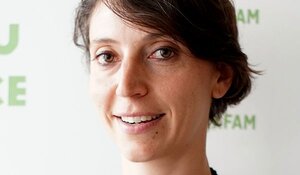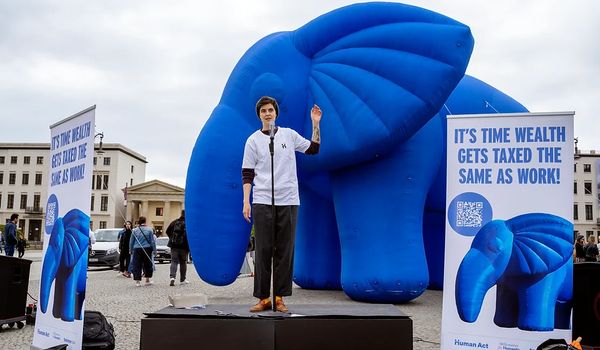Neuwirth: Marlene, you are one of the founders of “taxmenow”, an initiative of millionaires who demand to be taxed adequately. Why have you decided to become a “millionaire activist”?
Engelhorn: We were a group of wealthy people discussing inequality, how dangerous it is and how little was done about it, if at all. And we agreed that as wealthy people we could get media attention. Then we worked from there, writing down our key demands. It worked like a charm and now we are continuously talking to the media to help make sure that wealth taxation stays on the agenda. However, I am not sure I would call myself an activist. What I do is only possible because I have access to wealth and class privilege – the real activism happens in social movements.
Neuwirth: Chiara, you co-authored Oxfam’s report “Survival of the Richest”. The report was published at the beginning of this year’s World Economic Forum (WEF) in Davos. What are its core messages?

Putaturo: For the past ten years, Oxfam has published a report on inequality at the start of the WEF to document the latest developments. This year, it has two main messages: Firstly, inequality and the concentration of wealth have increased during the last decade, especially since the start of the Covid-19 pandemic. In the last 10 years billionaires could double their wealth, making almost six times more than the increase in wealth of the bottom half of the world’s population. Since 2020, the richest 1% could capture two thirds of all new wealth. Secondly, changing our current extremely unequal tax systems could be the solution. Elon Musk, the richest man in the world, paid only 3% taxes on his income last year, whereas Aber Christine, a market trader in Uganda, paid 40%. This was made possible by tax cuts for rich individuals and corporations.
Neuwirth: I guess that taxing the (ultra-)rich can be quite different from taxing wages of “normal” workers. How do the rich generate income, how do they invest their money, and how can their income and wealth be taxed? What if wealth is moved and hidden offshore?
Engelhorn: Taxing wealth is the oldest form of taxation, while taxing wages is rather young. You can use taxes to generate data which then creates more transparency about wealth distribution – a key in fighting inequality. And you could treat returns on wealth the same as you treat wages and tax them accordingly. It’s really a power play between the ultra-rich and those who want to create a more just society.
Putaturo: Labour and consumption are generally taxed much higher than capital income. The personal income tax brackets for the highest incomes are not high enough. In Austria, for example, highest-income earners pay 55%, no matter if they earn 1 million or 10 million Euro a year. And there are lots of exemptions from which the rich benefit most. Income for the rich often comes in the form of dividends, which are payments to shareholders. As an example profits of big corporations in the energy and food sectors grew by 2.5 times in 2022 and 84% of these profits were paid out in dividends to shareholders. Then the rich can receive income from capital gains (gains derived when assets are sold). Both dividends and capital gains are not taxed as high as labour or are even not taxed at all in some countries. The rich can also benefit from unrealised capital gains (the increase of the price of an asset that is not yet sold) – those can be used as collateral, for example, to get additional bank loans.

Wealth is often even less taxed than income. Wealth taxes include property, inheritance and net wealth taxes. Some countries do not have a property tax at all, some do have one, but it is not progressive. Many countries also do not have an inheritance tax, among them Austria and nine other EU countries. Half of the world’s billionaires live in such countries. As for wealth taxes, they were more frequent in the past – 12 OECD, and among them 8 EU countries, had one in the 1990s. Today only three OECD countries and one EU member state (Spain) have such a tax.
Wealth can also be hidden offshore, yes. But today there is more exchange of information between tax authorities, and there is more beneficial owners’ transparency. We could do more, for example by setting up an Asset Registry, in the EU or even on a global level.
Neuwirth: Marlene, together with other millionaires, you signed the letter “The Cost of Extreme Wealth” which was also introduced at the World Economic Forum. The letter closes by saying “Tax the ultra rich and do it now. (…) as millionaires we want to make that investment. What – or who – is stopping you?” Do you think there is enough public support for wealth taxes?
Engelhorn: The rich use their wealth to increase their wealth. Their financial advisors will always treat taxes as if they were waste. There is no understanding of how wealth depends on a well-resourced society. Their resources enable wealthy people to pay for an extremely aggressive anti-tax lobby. They are well connected to influential people and people in power and therefore hold power themselves. Unless we tax wealth and demand transparency from those who own this planet, we cannot decrease inequality. It is actually not difficult to change tax legislation, if you overcome the ultra-rich lobby of the 1% and do politics that are in the interest of the 99% who don’t own wealth but whose work and spending creates it. There are majorities in favour of taxing wealth. It’s a scandal that governments turn a blind eye to this and keep supporting false claims about how wealth taxes will harm the economy.
Putaturo: I agree. According to polls, in the US, in Brazil, India and in African countries the majority of people support the idea of taxing the rich. Resistance comes from financial institutions who supported tax cuts for the rich for decades. But there is a change in the narrative, even the International Monetary Fund or the European Central Bank support more progressive tax systems now. And there is increasing support from millionaires and billionaires, like Marlene. However, and here I agree with Marlene’s analysis, there are only few countries who have a net wealth tax because of the big influence of certain rich individuals on politics and on the media. But there is also a positive wave, with Argentina, Colombia, Bolivia and Spain having introduced wealth taxes. In Spain, revenues increased significantly, and not much wealth was shifted abroad yet. Argentina applied a one-off wealth tax and offered a tax discount to those Argentinians who moved their wealth back home.
Engelhorn: Yes, Spain shows right now that it is possible to take steps. Justice was and is never a gift from the privileged. Social movements are already fighting for social justice. They let us hope that we can and will reduce inequality, create tax justice and redistribute wealth and power for a society that is better for everyone. I have no doubt about that.
Neuwirth: There are more billionaires in the Global North compared to the Global South. Could wealth taxes, therefore, have an effect on increasing inequalities between the South and North?

Putaturo: We have to look at the concentration of wealth, not just at the numbers of the rich. Kenya, for example, has no billionaires but the top 0.1% own more than the 99.9% combined. We calculated the revenues of a net wealth tax in proportion to the GDP of a country: The potential in lower income countries, like Nigeria or India, would be much higher than in France or the USA. We also calculated how much revenues could come from just one person, like Carlos Slim in Mexico, and it is a lot! But we need to invest in administrative capacities to tax the rich. And there are imbalances between North and South with regards to the exchange of tax information. There are still countries in the Global South who are not able to participate in that exchange.
Neuwirth: It seems like much more public pressure is needed until we really see the (ultra-)rich pay their fair share of taxes. How can people support your work?
Putaturo: People could use the Oxfam report as well as the tools we provide to make others aware of the problem as well as of the solutions. And people should put pressure on politicians.
Engelhorn: People can join social movements, they can talk about money and reflect on wealth as power, privately as well as publicly. We should hold our democratic governments accountable. I seriously want to encourage everyone to stand up and to use basic democratic rights, such as the right to freedom of speech and assembly, to demand tax justice. We are not alone, in fact, we become more (22 March 2023).

